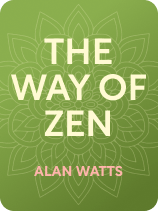

This article is an excerpt from the Shortform book guide to "The Way of Zen" by Alan Watts. Shortform has the world's best summaries and analyses of books you should be reading.
Like this article? Sign up for a free trial here.
Is Zen Buddhism Mahayana? How did ideas from India shape a philosophy that emerged in China?
Alan Watts discusses the origins of Zen Buddhism in his book The Way of Zen. He explains that Zen ideas came largely out of three different traditions. One of these is Mahayana Buddhism, and Watts outlines two concepts that the two philosophies share.
Keep reading to learn how Mahayana Buddhism helped shape Zen Buddhism.
Is Zen Buddhism Mahayana?
Is Zen Buddhism Mahayana? Zen is considered to be a form of Mahayana Buddhism, but Mahayana is only one school of thought that Zen and its ideas trace back to. The others are Taoism and Confucianism, which are Chinese forms of thought and religion. On the other hand, Mahayana Buddhism is an Indian school of Buddhism. Each of the three traditions contributed ideas that would become foundational to Zen Buddhist teachings about life and enlightenment. Let’s examine Mahayana Buddhism and its influence on Zen.
Mahayana Buddhism reframes the pursuit of nirvana, the traditional Buddhist idea of release from karma and cycles of death and rebirth. Mahayana takes the idea of this cycle figuratively, explaining that the pursuit of nirvana is futile and we’re continually reborn from moment to moment until we stop trying to escape what’s really happening in the present moment.
(Shortform note: Mahayana Buddhism is a family of Buddhist traditions (rather than a singular school) that proposes that all beings possess the potential for awakening. So it’s not surprising that while Watts characterizes Mahayana’s views of karma and nirvana as figurative, other scholars offer alternate explanations. Philosopher Jay Garfield explains that it’s a core idea of Buddhism that we’re reborn every moment. Some traditions also teach that we’re reborn to new biological lives while others don’t consider this idea important or take it literally. But Garfield notes that in Mahayana Buddhism, a belief in cycles of biological rebirth is almost a prerequisite: Pursuing awakening is difficult and may require multiple lifetimes to achieve.)
Two ideas from Mahayana Buddhism had a major impact on Zen: the idea that we don’t perceive the world as it really is and the idea that there’s nothing for us to attain in life.
We Don’t Perceive the Real World
Important to Zen is Mahayana Buddhism’s teaching that illusions obscure your perception of the world. Watts explains that the principle of maya is that the language we use to describe the world obscures what it really is. Maya is about relativity: We name things like “light” and “darkness” or “good” and “evil” and consider them opposites. But, in reality, they aren’t separate. Watts explains that Hindus and Buddhists refer to the world as “nondual” rather than as “one” because even the concept of “one” draws on a false duality (it’s conceptually opposite to “many”). Letting go of the impulse to name and delineate things enables you to perceive the relativity and impermanence of the world and experience moksha, a “liberation” from maya.
(Shortform note: Experts say that maya hides the true nature of reality and moksha occurs when we shed the illusions of maya. Writer George Saunders, who practices Nyingma Tibetan Buddhism, explains that Buddhists believe a significant gap exists between the way things are and the way we perceive them, and this causes suffering. Saunders notes that if we could believe what Buddhism teaches—that our lives are impermanent, the world as we know it is transient, and that we have no fixed self—then our pain would disappear.)
It follows from the principles of maya and moksha that language also curtails what you can understand of yourself. Watts writes that in all forms of Buddhism, you can’t apprehend your true self because there’s no permanent or unchanging self to understand. He points out that what you think of as your self or ego is just an abstraction. Your true self eludes your understanding if you hold onto that abstraction.
(Shortform note: Novelist and Zen priest Ruth Ozeki explains that according to Zen, the idea of a separate self is an illusion. She compares our self-concept to that of a wave in the ocean: The wave might think that it’s something discrete and separate from all the other waves for a moment, but in reality, there’s no border between it and the rest of the ocean. Similarly, Eckhart Tolle writes in A New Earth that your ego creates a false self-image that obscures your true inner self. He explains that mindfulness requires accessing your true self because it’s part of the energy that directs the entire universe.)
There’s Nothing to Pursue or Attain, Not Even Nirvana
Another Mahayana idea that’s foundational to Zen is the doctrine that there’s nothing for us to grasp at, even nirvana. (One of the Four Noble Truths of Buddhism is nirvana, which Watts characterizes as analogous to moksha. Nirvana is a state of awakening.) When we seek things, we fail to see that everything exists in a state of relativity, where nothing exists except in relation to other things.
The origin of this idea is unclear. Watts writes that some scholars think that one of the earliest ideas of Mahayana Buddhism was that one could be a Bodhisattva and reach enlightenment by foregoing nirvana until all beings can experience it. But Watts argues that the idea underlying the Bodhisattva is implicit in the logic of Buddhism: Nirvana is a state you reach when you stop trying to grasp reality. But if there’s nothing to grasp, then how is there anything to attain?
(Shortform note: The idea of giving up all seeking, including the pursuit of awakening, sounds counterintuitive. Experts say that a Bodhisattva simply gives up their desires so they can help others achieve theirs. In Street Zen, a biography of Zen monk Issan Dorsey, David Schneider writes that being a Bodhisattva involves becoming the kind of person who helps others attain freedom from illusions. Schneider characterizes Dorsey as an “unlikely Bodhisattva”: He became a Zen master after being discharged from the US Navy for homosexuality, working as a drag queen, and experiencing drug addiction. Dorsey looked on people leading similar lives with “a direct, personal compassion” and established a hospice for men dying of AIDS in the 1980s.)
The word tathata, often translated as “suchness,” represents the true state of all beings, including Buddhas, people who have experienced awakening. That means that all beings can become Buddhas. It also means that by letting go of the abstractions through which you usually see the world and yourself, you can experience the world in its “suchness.” Watts explains that the use of a word like “suchness” to describe the true nature of all beings is intended to remind us that while “meaning” is a quality of thought or language, it doesn’t exist in the actual world. In other words, the idea of a person is separate from the reality of the person.
(Shortform note: Other experts agree that tathata, or suchness, is a crucial concept in Zen. In Religions of Japan in Practice, Jacqueline I. Stone writes that from the idea of suchness, it follows that you don’t practice Buddhism to attain Buddhahood but instead to express it. She explains that a 12th-century text called Shinnyo kan, or “Contemplation of Suchness,” posits that Buddhahood lies in the contemplation of yourself and other entities in their suchness, removed from false ideas about their permanence or separateness from each other.)

———End of Preview———
Like what you just read? Read the rest of the world's best book summary and analysis of Alan Watts's "The Way of Zen" at Shortform.
Here's what you'll find in our full The Way of Zen summary:
- The major principles and history of Zen Buddhism
- How to experience Zen in everyday life—without a strict meditation practice
- Why calling Zen a "practice" is a mistake






